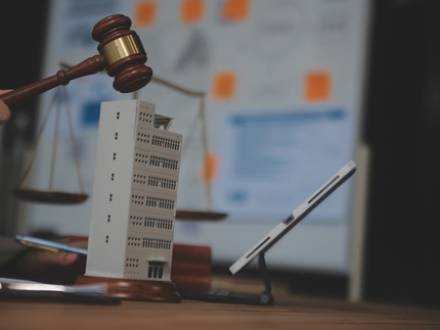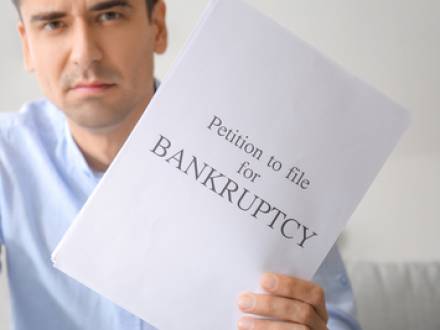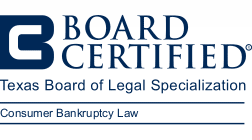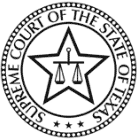Recent Blog Posts
What Debts Are Not Dischargeable In Bankruptcy?
 Filing for bankruptcy can provide much-needed relief from overwhelming debt, but it is important to understand that not all debts can be wiped clean. Federal bankruptcy law specifically excludes certain types of debts from discharge, meaning you would still be responsible for paying them even after your bankruptcy case closes. The good news, however, is that most of the common types of debts such as credit card debt are dischargeable. An experienced Conroe, TX bankruptcy attorney can advise you on whether filing for bankruptcy is right for you.
Filing for bankruptcy can provide much-needed relief from overwhelming debt, but it is important to understand that not all debts can be wiped clean. Federal bankruptcy law specifically excludes certain types of debts from discharge, meaning you would still be responsible for paying them even after your bankruptcy case closes. The good news, however, is that most of the common types of debts such as credit card debt are dischargeable. An experienced Conroe, TX bankruptcy attorney can advise you on whether filing for bankruptcy is right for you.
What Types of Debts Cannot Be Erased in Bankruptcy?
Priority Debts
Tax obligations top the list of non-dischargeable debts. Recent income taxes (typically within three years of filing), payroll taxes, and tax penalties generally cannot be eliminated through bankruptcy. However, older income tax debts may qualify for discharge under specific circumstances.
Who Is Eligible to File Chapter 13?
 Chapter 13 bankruptcy offers a lifeline for people struggling with debt. Unlike Chapter 7 bankruptcy, which liquidates assets to pay back creditors, Chapter 13 creates a manageable repayment plan that generally lasts three to five years. However, not everyone qualifies for this "wage earner's plan."
Chapter 13 bankruptcy offers a lifeline for people struggling with debt. Unlike Chapter 7 bankruptcy, which liquidates assets to pay back creditors, Chapter 13 creates a manageable repayment plan that generally lasts three to five years. However, not everyone qualifies for this "wage earner's plan."
Those who do can take advantage of Chapter 13’s unique benefits, including the ability to keep certain non-exempt property such as a second home or valuable personal assets. Speak to our experienced Brazoria, TX Chapter 13 bankruptcy attorney to figure out if you qualify for Chapter 13 bankruptcy.
How Do You Qualify for Chapter 13?
Maintain a Regular Income
Because you have to make payments into a plan, you must have an income to file Chapter 13. The income requirement does not mean that you must have a full time job, however. Social Security benefits, disability payments, pension income, rental property income, or even regular unemployment benefits can help you qualify. However, your income must be steady and predictable enough to make monthly plan payments for the three to five year Chapter 13 duration. Self-employed individuals and business owners can also file Chapter 13, but they will need to demonstrate consistent income patterns.
What Are Adversary Proceedings in Bankruptcy?
 Whether you file for Chapter 7 or Chapter 13 bankruptcy, either chapter follows a fairly linear process. However, sometimes questions, disputes, or unexpected issues arise in the course of your bankruptcy. The process whereby these disputes are addressed in bankruptcy is called an adversary proceeding, and it is a type of lawsuit that is part of the bankruptcy case. Adversary proceedings may only be filed in certain specific circumstances and only by interested parties. They follow many of the same rules as regular lawsuits, including formal complaints, motions, and court hearings. An experienced Liberty County, TX bankruptcy attorney can represent you throughout the bankruptcy process and in an adversary proceeding.
Whether you file for Chapter 7 or Chapter 13 bankruptcy, either chapter follows a fairly linear process. However, sometimes questions, disputes, or unexpected issues arise in the course of your bankruptcy. The process whereby these disputes are addressed in bankruptcy is called an adversary proceeding, and it is a type of lawsuit that is part of the bankruptcy case. Adversary proceedings may only be filed in certain specific circumstances and only by interested parties. They follow many of the same rules as regular lawsuits, including formal complaints, motions, and court hearings. An experienced Liberty County, TX bankruptcy attorney can represent you throughout the bankruptcy process and in an adversary proceeding.
How Does Chapter 11 Bankruptcy for Businesses Work?
 When businesses face financial headwinds, filing for bankruptcy can be a way to grapple with overwhelming debt and declining profits. Federal bankruptcy law offers a number of paths for businesses to file for bankruptcy. In Chapter 7 bankruptcy for small businesses, the business is sold and its assets liquidated, for instance.
When businesses face financial headwinds, filing for bankruptcy can be a way to grapple with overwhelming debt and declining profits. Federal bankruptcy law offers a number of paths for businesses to file for bankruptcy. In Chapter 7 bankruptcy for small businesses, the business is sold and its assets liquidated, for instance.
But not all bankruptcy chapters spell the end of a business venture. Chapter 11 – known as the reorganization bankruptcy – gives businesses a chance to file for bankruptcy while continuing operations. This can provide organizations with an opportunity to get a new lease on life following Chapter 11.
Although Chapter 11 can be expensive and may not be the best fit for small businesses or sole proprietorships, who might benefit more from Chapter 11 Subchapter V or Chapter 13, respectively, it does have significant benefits. An experienced Montgomery County, TX Chapter 11 bankruptcy attorney can advise your organization on the benefits of reorganizing.
How Do You Pass the Means Test?
 Chapter 7 bankruptcy gives certain qualifying debtors the opportunity to get a financial fresh start by discharging much of their qualifying debt. It also has many benefits, including the fact that it is a relatively short process lasting only four to six months. Additionally, debtors also get to keep several important assets that are exempt from the bankruptcy estate. However, you must qualify for Chapter 7 by passing the means test, an income calculation used to determine eligibility to file for Chapter 7. An experienced Harris County, TX Chapter 7 bankruptcy attorney can offer advice on the requirements for passing the means test.
Chapter 7 bankruptcy gives certain qualifying debtors the opportunity to get a financial fresh start by discharging much of their qualifying debt. It also has many benefits, including the fact that it is a relatively short process lasting only four to six months. Additionally, debtors also get to keep several important assets that are exempt from the bankruptcy estate. However, you must qualify for Chapter 7 by passing the means test, an income calculation used to determine eligibility to file for Chapter 7. An experienced Harris County, TX Chapter 7 bankruptcy attorney can offer advice on the requirements for passing the means test.
What Is the Means Test?
To qualify for Chapter 7 bankruptcy, your income cannot exceed a certain income ceiling. This policy is in place in order to ensure that people do not take advantage of Chapter 7 bankruptcy and that only those who do not have enough income to pay their creditors can file. The calculation used for determining whether your income is below the Chapter 7 income threshold is called the means test.
How Do You Meet the Best Effort Requirement for Chapter 13?
 Chapter 13 bankruptcy can be a powerful way for someone with a significant amount of debt to get a fresh start, all while keeping most of their assets. In a Chapter 13 case, the debtor will make a payment plan to repay their debts over three to five years, while continuing to make payments on secured debt like mortgages and car loans. It is often called the "wage earner’s plan" because it is utilized by those who have an income to make these payments. To get approval for this repayment plan, the debtor must show that it would be their "best effort" to pay back the debt. What does it mean for the Chapter 13 plan to be the "best effort" to pay back debt, and how can the debtor prove "best efforts?" Read on to find out, and speak with an experienced Austin County, TX Chapter 13 bankruptcy attorney about any further questions.
Chapter 13 bankruptcy can be a powerful way for someone with a significant amount of debt to get a fresh start, all while keeping most of their assets. In a Chapter 13 case, the debtor will make a payment plan to repay their debts over three to five years, while continuing to make payments on secured debt like mortgages and car loans. It is often called the "wage earner’s plan" because it is utilized by those who have an income to make these payments. To get approval for this repayment plan, the debtor must show that it would be their "best effort" to pay back the debt. What does it mean for the Chapter 13 plan to be the "best effort" to pay back debt, and how can the debtor prove "best efforts?" Read on to find out, and speak with an experienced Austin County, TX Chapter 13 bankruptcy attorney about any further questions.
How Does the Brunner Test Affect Student Loans in Bankruptcy?
 Education is a key to opportunity and, in today’s world, having a college or advanced degree can make a significant difference in the employment and earning opportunities available to you. Education is also incredibly expensive, and most people need to take out student loans to finance theirs. Sometimes, however, the burden of paying back those loans becomes too much to handle, or life events pile on unexpected financial issues that compound debt. In such cases, individuals with a great deal of debt might consider filing for bankruptcy. Student loan debt may not always be dischargeable in bankruptcy, however, and the Brunner Test can help determine whether or not it can. Speak to an experienced Galveston, TX bankruptcy attorney for advice on your specific case.
Education is a key to opportunity and, in today’s world, having a college or advanced degree can make a significant difference in the employment and earning opportunities available to you. Education is also incredibly expensive, and most people need to take out student loans to finance theirs. Sometimes, however, the burden of paying back those loans becomes too much to handle, or life events pile on unexpected financial issues that compound debt. In such cases, individuals with a great deal of debt might consider filing for bankruptcy. Student loan debt may not always be dischargeable in bankruptcy, however, and the Brunner Test can help determine whether or not it can. Speak to an experienced Galveston, TX bankruptcy attorney for advice on your specific case.
What Happens to Student Loans in Chapter 7 Bankruptcy?
Most bankruptcy courts in Texas use the Brunner Test to determine whether you qualify to have your student loans discharged in Chapter 7 bankruptcy. Under this tough three-factor test, the court will consider whether:
How Do Bankruptcy and Divorce Affect One Another in Texas?
 Certain times in life test you to the limit, yet when you come out on the other side you may have more freedom and be better off financially. If you find yourself filing for divorce and bankruptcy at or around the same time, or are considering doing so, you are likely experiencing very tough times. Practically speaking, you will want to know whether it is even possible to file for divorce and bankruptcy around the same time, and how that would work. Because divorce and bankruptcy both affect your finances, filing for one will have a practical effect on the other. An experienced Conroe, TX bankruptcy attorney can advise you on how bankruptcy and divorce affect one another.
Certain times in life test you to the limit, yet when you come out on the other side you may have more freedom and be better off financially. If you find yourself filing for divorce and bankruptcy at or around the same time, or are considering doing so, you are likely experiencing very tough times. Practically speaking, you will want to know whether it is even possible to file for divorce and bankruptcy around the same time, and how that would work. Because divorce and bankruptcy both affect your finances, filing for one will have a practical effect on the other. An experienced Conroe, TX bankruptcy attorney can advise you on how bankruptcy and divorce affect one another.
How Does Marital Debt Work in Texas?
Texas is a community property state, meaning that both assets and debts from the marriage are owned jointly in marriage, and divided equally in a divorce. If your spouse amassed most of their debt before the marriage, you will not be liable for that debt in a divorce. If they amassed most of that debt during the marriage, you would generally be liable for a portion of that debt. However, creditors can sometimes pursue community property to satisfy one spouse's debt. How much marital debt and how much individual debt you have separate from your spouse’s debt should factor into your decision about when to file for bankruptcy.
How Do You File for Bankruptcy?
 Can you file for bankruptcy by simply yelling out that you declare bankruptcy? Famous fictional boss Michael Scott from the hit television show The Office thought so, yelling "I declare bankruptcy" loudly in his attempt to find some relief from pressing financial troubles. Although most of us who face similar financial issues will not assume the process is as simple as he did, many people may be wondering how you go about filing for bankruptcy.
Can you file for bankruptcy by simply yelling out that you declare bankruptcy? Famous fictional boss Michael Scott from the hit television show The Office thought so, yelling "I declare bankruptcy" loudly in his attempt to find some relief from pressing financial troubles. Although most of us who face similar financial issues will not assume the process is as simple as he did, many people may be wondering how you go about filing for bankruptcy.
Bankruptcy is a formal legal process that takes place in special bankruptcy courts and has financial and legal implications. Read on to learn about how to file for bankruptcy, but be sure to speak with an experienced Brazoria, TX bankruptcy attorney who can answer your questions, present your options, and file for bankruptcy on your behalf.
What is Bankruptcy?
Bankruptcy is a process enshrined in law that allows debtors to get a financial fresh start if they are unable to pay back their debts. It also allows creditors to get repaid, generally to the extent you have money for repayment. There are several different types of bankruptcy, most notably Chapter 7 and Chapter 13. The kind of debt that can be discharged (erased), how, and other details of bankruptcy law vary greatly depending on the bankruptcy chapter a debtor files.
How Will Bankruptcy Impact My Credit Score?
 The most obvious among the benefits of bankruptcy is the relief that comes from removing or reducing oppressive debt. However, it will negatively impact your credit score, immediately and in the long term. The good news is that this is not a permanent change. Exactly how your credit score and report are affected depends on the type of bankruptcy you file. An experienced Brazoria, TX bankruptcy attorney can explain the legal options you have for bankruptcy, the pros and cons of each, and the factors considered when deciding which type of bankruptcy best suits your situation.
The most obvious among the benefits of bankruptcy is the relief that comes from removing or reducing oppressive debt. However, it will negatively impact your credit score, immediately and in the long term. The good news is that this is not a permanent change. Exactly how your credit score and report are affected depends on the type of bankruptcy you file. An experienced Brazoria, TX bankruptcy attorney can explain the legal options you have for bankruptcy, the pros and cons of each, and the factors considered when deciding which type of bankruptcy best suits your situation.
What Happens to Credit Immediately After Filing for Bankruptcy?
Chapter 7 and Chapter 13 consumer bankruptcies are the two most commonly filed. Immediately after you file, meaning within the first few months, you can expect to see a drastic dip in your credit score. The reasons for this nearly instant drop include:











